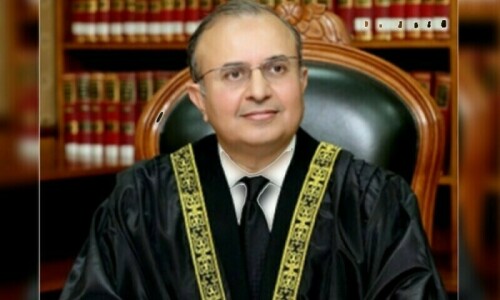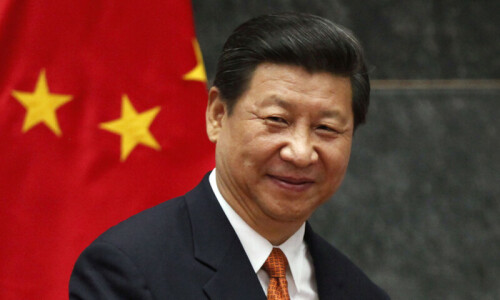
Great Muslims of the West: Makers of Modern Islam by Muhammad Mojlum Khan is a valuable book that provides a wealth of information on a subject of great substance, illustrated through the lives of 75 extraordinary individuals of Europe and North America, and written with a lucidity that makes for fluent readability.
Extensively researched over a period of three years — as evident from a 20-page select but far-ranging bibliography — the book spans 1,446 years from the birth in 570AD of Prophet Muhammad (PBUH) to 2016. A helpful chronology marks over 400 milestones on the journey of Islam through time and over four continents. The individuals included — 68 men and seven women — are vividly portrayed and, in the author’s view, best represent the subject as defined by the book’s title.
Being rightfully concerned at the disparity in numbers between the featured men and women, the introduction states: “... Muslim women have played a proactive, pivotal role in the development of Islamic thought, culture and civilisation, although it is equally true that they, more often than not, preferred to make their contributions from behind the scenes. [Because of] their humility and humbleness, they often avoided the limelight and, for that reason, their contribution and achievements were not always recorded and acknowledged...”
A wealth of information about 75 Muslims who impacted Western civilisation also provides correctives to dominant narratives
Yet the difficulties faced are not confined to lack of accurate data about Western Muslim women alone. As pointed out in the conclusion, historian R. Stephen Humphreys in his 1991 book Islamic History: A Framework for Inquiry, wrote: “Islamic history presents severe challenges even to an experienced specialist. Many of these are technical in nature — [for example] the multitude of languages needed to read both sources and modern scholarship, the vast number of major texts still in manuscript, [and] the poor organisation of libraries and archives. More important, however, is the difficulty of grasping the subject as a whole, of developing a clear sense of the broad themes and concepts through which this sprawling and underdeveloped field of study can be bound together.”
Despite formidable disadvantages, the author accomplishes the goal outlined in the title with notable courage and competence. A British citizen of Bangladeshi origin in his mid-40s, Khan is a respected research scholar and award-winning writer whose work has been translated into several languages. A Fellow of the Royal Asiatic Society of Great Britain and Ireland, he is the director of the Bengal Muslim Research Institute, UK. This is his third book after previous works titled The Muslim 100: The Lives, Thoughts and Achievements of the Most Influential Muslims in History (2008) and The Muslim Heritage of Bengal: The Lives, Thoughts and Achievements of Great Muslim Scholars, Writers and Reformers of Bangladesh and West Bengal (2013).
The 75 individuals Khan brings together in this book are placed in three categories. There are 22 personalities in ‘The Early Period’ (800-1700AD), 28 figures in ‘The Modern Period’ (1700-2016AD) and 25 ‘Honourable Mentions’. While acknowledging that the number is neither definitive nor comprehensive, the author asserts with confidence that this gallery of distinguished lives highlights “... the pivotal role played by Western Muslims in the development of Western civilisation.” To ensure clarity and precision about the term ‘West’, the writer states that for the purposes of this book, the area includes western and eastern Europe — including the Balkans, Russia, Tatarstan, Crimea and Ottoman Turkey — and North America and Canada. He excludes the Caribbean, central and south Americas and parts of North Africa for brevity and simplicity.

In order to persuasively prove the legitimacy of the term ‘Western Islam’, the author states: “Western Islam shares its fundamental Islamic beliefs, principles and values with Eastern Islam, but it has its own distinct history, culture and geography... Western Islam is as geographically widespread and culturally vibrant as Eastern Islam, if not more so.”
Khan’s selection of individuals embodying the book’s subject is far-reaching and fascinating. He begins ‘The Early Period’ with the pioneering secular Umayyad ruler of Spain, Abd al Rahman, who “... became the first European ruler to offer official recognition to his minority subjects, including Jews and Christians. As a result, they played a proactive part in the political, social, economic and cultural life of Andalus and did so without having to dilute or renounce their faith and culture. Thus the credit for initiating a culture of tolerance and co-existence [in Spain] ... must go to none other than Abd al Rehman...”
Beginning with that noble statesman, the author introduces us to over four dozen outstanding characters over a period of about a millennium and a half, including Noor Inayat Khan, the gifted linguist and incredibly daring South Asian woman who became a secret radio operator for Britain in Nazi-occupied France during the Second World War and sacrificed her life for the Allies. Another woman with an astonishing life was Roxelana, later known as Hurrem Sultan. Born into a Christian Orthodox family in Ukraine/Poland in the 16th century and sold into slavery multiple times, she became part of the Ottoman sultan Suleman the Magnificent’s harem and converted to Islam. Her stunning beauty completely captivated the sultan, but she was also highly intelligent and capable and soon came to exert a strong, benign and compassionate influence on political, cultural and welfare issues.
Khan concludes ‘The Modern Period’ with Muhammad Ali, the brave, brilliant boxing champion who transcended all conventional boundaries. As the eminent American poet Maya Angelou wrote of him, “Muhammad Ali was not just Muhammad Ali the greatest, the African-American pugilist; he belonged to everyone. That means that his impact recognises no continent, no language, no colour, no ocean.”
The ‘Honourable Mentions’ comprise shorter passages about diverse persons. From Al Hakam II in 10th century Cordova, who was “an insatiable seeker and disseminator of knowledge [whose] personal library alone housed around half a million books and manuscripts, being the largest library in the world” at a time when the printing press had not been invented and each book had to be handwritten, to Lord Rowland Headley — also known as Shaikh Rahmatullah al Farooq — of Ireland in the 19th/20th centuries who established the British Muslim Society in 1914 and served as its first president.
Upon reading Khan’s book, at least seven truths emerge. First, the advent of Islam in the West was only nominally through force, but most substantively, unlike hierarchal Christianity, Western Islam endured because of its egalitarianism. Second, Western Islam continued to exist, expand and thrive for hundreds of years after 1492 when King Ferdinand and Queen Isabella expelled Muslims from Spain, exerting its influence in various ways. For instance, Muslims ruled Hungary and other eastern European areas for 400 years thereafter, while Muslim Ottoman finery and textiles were the preferred choice at the court of England’s king Henry VIII. Third, in the first phase of Western Islam in Spain, the Umayyads rejected the custodians of Eastern Islam represented by the Fatimids in Cairo and the Abbasids in Baghdad. Fourth, the Western Judeo-Christian intellectual narrative — with only a few laudable exceptions such as historians Norman Davies and Fernand Braudel — has predominantly ignored and wilfully suppressed the continued influence of Western Islam on the evolution of European and Western development in the intellectual, scientific, economic and cultural realms. Even the renowned Bertrand Russell in his book A History of Western Philosophy, comprising 800 pages, devoted less than nine pages to Muslim contribution to philosophy.
Fifth, the manipulative, controlled and distortive narrative propagated by academia, the media and political segments of the West — particularly post-9/11 — which portrays Islam and Muslims to be polar opposites to Judeo-Christian values is neither true nor soundly supported by the historical record. Sixth, far more investment in research into Western Islam should be made by Eastern Islam, particularly by the oil-rich states. And finally, the seventh truth is that Western Islam, like Eastern Islam — but unlike Christianity which also originated from the east — is the most inclusive of the three Abrahamic revealed religions because Islam stresses respect for all prophets of the other two faiths.
For general readers and students, and for media writers and scholars, this book is worth reading and preserving. Minor errors will hopefully be corrected before the next edition.
The reviewer is a writer and former senator and federal minister
Great Muslims of the West: Makers of
Western Islam
By Muhammad Mojlum Khan
Kube, UK
ISBN: 978-1847741127
205pp.
Published in Dawn, Books & Authors, March 24th, 2019















































